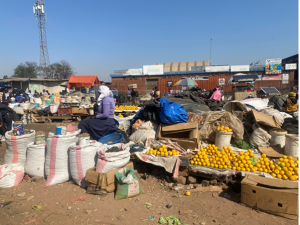Across Africa, uncoordinated agricultural programs by government and development organizations have continue to increase food losses and undermine efforts to build strong business cases. At national level, there is often no connection between government and donor-driven programs that focus on the same value chains. Commodities from diverse similar interventions often converge in the same market whose capacity cannot be stretched to absorb over-production.

Since fragmented production makes it difficult to define existing production systems, it also makes it difficult to frame business cases for communities where particular commodities do well naturally. For instance, communities in which avocado is the main economic driver should be able to build viable business case around that fruit. Likewise, where indigenous poultry and goats thrive naturally, there should be business cases around these commodities. Fragmented production also fragments market information as each program can work with different market actors who do not share information with other actors who are also targeting the same consumers.
Without market intelligence and statistics, it becomes difficult to build viable business cases around particular value chains. Quantities of commodities provoked by uncoordinated production try to get into market ecosystems that have developed their own pathways and relationships over time. Key questions should include: To what extent are these commodities filling any new gaps, supplementing or compromising/disrupting existing supplies? In addition to categorizing diverse production models, it is important to understand production practices and changes in land use that often happen without alerting the market or demand side. To what extent do changes in land use complement supplies, gaps, gluts or shortages? What are the trade-offs? All these questions need answers.
The value of paying attention to cross-cutting mandates
Cross-cutting mandates are some of the issues that have not received sufficient attention in most African countries. For instance, some food standards issues that are under the ministry of health are also the domain of the ministry of industry and commerce. These duplications can be addressed through codifying food standards and setting clear boundaries on who should do what. It is also often taken for granted that many farmers and food traders may not have the capacity to carefully grade and handle food in ways that minimize physical and economic losses. Farmers lose income if they lack capacity to grade their commodities and only wait for buyers to set grading standards.
Other cross-cutting issues relate to mechanization and infrastructure. These are often missing in African mass food markets. If mechanization is poor it leads to poor quality products and economic losses. To what extent does market infrastructure create food loses? Careful positioning of infrastructure is critical. Some infrastructure set up by NGOs, government, local authorities and the private sector has become white elephants because users were not consulted. More importantly, many local authorities like municipalities and rural district councils lack evidence-informed growth plans. Data and evidence can help them answer questions like how can we expand market infrastructure without destroying the existing market and trading patterns? Local authorities need to learn from commodities that are coming from the ministry of agriculture.
Policies need to support value chains in communities where they thrive naturally
Instead of foisting wheat, tobacco, sugar cane, cocoa, soya on any other external crops in communities where indigenous commodities grow with minimum effort, policy makers need to support existing opportunities. When communities are empowered, they will become competitive in the market and demonstrate capacity to produce surplus for economic benefit. What are policy makers doing to support natural economic drivers and fair trade? If leaders do not promote their own indigenous food, outsiders will not do so because they do not know much about local food systems. African policy makers cannot claim to support food sovereignty when they are not offering competitive prices for indigenous food. Giving economic value to indigenous food will ensure Gross Domestic Product (GDP) is not only about tobacco, wheat and maize but bringing to the world the value of natural products and indigenous food systems. Funding should be designed in ways that enhance community resilience as opposed to siloed funding models that have been promoted across Africa for decades. Fragmented funding models make it difficult to assess whether farming communities are going forward or going backward and losing their original food systems. With the right funding, local leaders can become champions of indigenous food systems. A fundamental question for African leaders at every level is what are you doing to support indigenous food system, culture, tradition and protect natural resources?
Charles@knowledgetransafrica.com / charles@emkambo.co.zw /
Website: www.emkambo.co.zw / www.knowledgetransafrica.com
Mobile: 0772 137 717/ 0774 430 309/ 0712 737 430
